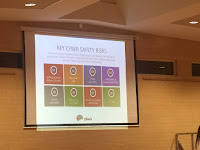Sacred Heart Highgate - Our Journey in Educational Technology
Wednesday, 21 June 2017
Cyber Safety Parent Workshop
Last night , over 70 parents and teachers attended the YSafe Cyber Safety Parent workshop. The feedback from parents has been very positive. We have decided that this will be an annual event for all parents to attend.
 Jordan Foster, psychologist and director of YSafe, discussed many relevant social media, gaming and internet topics. She also discussed issues around technology use for children ranging from 4 years old to the early teens. We would like to thank all the parent who attended this informative evening and appreciate the support in keeping the students at Sacred Heart safe online. Parents who were unable to attend, we strongly encourage you to attend our next Cyber safety Parent workshop, so we can share these strategies.
Jordan Foster, psychologist and director of YSafe, discussed many relevant social media, gaming and internet topics. She also discussed issues around technology use for children ranging from 4 years old to the early teens. We would like to thank all the parent who attended this informative evening and appreciate the support in keeping the students at Sacred Heart safe online. Parents who were unable to attend, we strongly encourage you to attend our next Cyber safety Parent workshop, so we can share these strategies.
Jordan urged all parents to remember the ABC of cyber safety management and to attempt at least one of the strategies, or all three to be most effective.
- Control ACCESS
- Set BOUNDARIES
- Openly COMMUNICATE
Some links that may be helpful…
Common Sense Media - https://www.commonsensemedia.org/
Family zone- https://www.familyzone.com/au/
eSafety Office- https://www.esafety.gov.au/
Wednesday, 8 March 2017
CYBER SAFETY- INTERESTING SITES
http://www.cybersafetysolutions.com.au/fact-internet-safety-tips-kids.shtml
Jigsaw: for 8 -10 year olds
Safe Web Surfing: Top Tips for Kids and Teens Online
THINK U KNOW
2017 Year 4 MacBook WorkShop
 Thank you, to all the Year 4 parents who joined us in learning more about the Sacred Heart 1:1 Laptop Program, on Tuesday 7th March.
Thank you, to all the Year 4 parents who joined us in learning more about the Sacred Heart 1:1 Laptop Program, on Tuesday 7th March.We spent the evening discussing several topics, brought to our attention, from the parent survey, distributed before the workshop.
After discussing the requirements for the mandated Western Australian Curriculum and the cyber safety programs implemented at Sacred Heart, we worked together in a hands-on Google Slides session.
The parents participated in a mock classroom experience, where they experienced first hand, how the MacBook laptop is integrated into the curriculum and classroom practices.
We appreciated the enthusiasm the parents displayed, in completing the task set for them.
If you have any questions or concerns please contact your teacher or the leadership team.
Thank you to TechTree's Mr Derek Stewart and Mr Nick Stanley for sharing their tech expertise with the parents.
We look forward to offering the Parents at Sacred Heart Primary School, Highgate, the opportunity to attend A Cyber Safety Parent Workshop, in the coming terms.
Watch this space!
Tuesday, 19 April 2016
Digital Citizenship |
What is Digital Citizenship?
Digital citizenship is defined as the norms of appropriate, responsible behaviour with regard to technology use. The
key themes of digital citizenship address how to be ethical, safe and
secure in online environments. It is often also classified under 9
specific elements here
What is the context of Digital Citizenship ?
The three key contexts through which Digital Citizenship should be addressed in schools are:
Why do Catholic Schools need to address Digital Citizenship?
With the growth of Bring Your Own Device (BYOD) and 1:1 initiatives
in schools there is a need to talk about appropriate and responsible
use of technology within the context of our faith. Evidence suggests
many students are not provided with support in their use of technology.
There are many organizations and individuals that are working on this
topic. This site attempts to aggregate
appropriate high quality digital citizenship advice and resources for
schools, teachers and parents.
How does the National Safe Schools Framework fit in ?
The
National Safe Schools Framework was ratified by state and territory
Education Ministers in 2010. It was re-ratified in 2013 as a document
that all schools should be addressing
There are 9 elements of the National Safe Schools Framework
1. Leadership commitment to a safe school
2. A supportive and connected school culture
3. Policies and procedures
4. Professional learning
5. Positive behaviour management
6. Engagement, skill development and safe school curriculum
7. A focus on student wellbeing and student ownership
8. Early intervention and targeted support
9. Partnerships with families and community
Nine Themes of Digital Citizenship
1.Digital Etiquette: electronic standards of conduct or procedure.
2.Digital Communication: electronic exchange of information.
3.Digital Literacy: process of teaching and learning about technology and the use of technology.
4.Digital Access: full electronic participation in society.
5.Digital Commerce: electronic buying and selling of goods.
6.Digital Law: electronic responsibility for actions and deeds
7.Digital Rights & Responsibilities: those freedoms extended to everyone in a digital world.
8.Digital Health & Wellness: physical and psychological well-being in a digital technology world.
9.Digital Security (self-protection): electronic precautions to guarantee safety.
A digital footprint
is the data trail left by activity in a digital environment such as
email and social networks on the Internet but also may include Mobile
telephone and other digital devices and sensors. Digital footprints are
invisible electronic representations of memories and opinions, and
provide data on physical and online activities.
Information from the CNA website view @
http://cnadigitalcitizenship.weebly.com/digital-citizenship.html
|
2016 Year 4 Parent MacBook Workshop
The Year 4 parents were invited to a Macbook workshop.
Using a Google form survey, we asked the parents what they wanted to learn about the 1 to 1 laptop program.
The following presentation walks us through the topics for the evening.
The links below were also discussed.
Subscribe to:
Comments (Atom)





